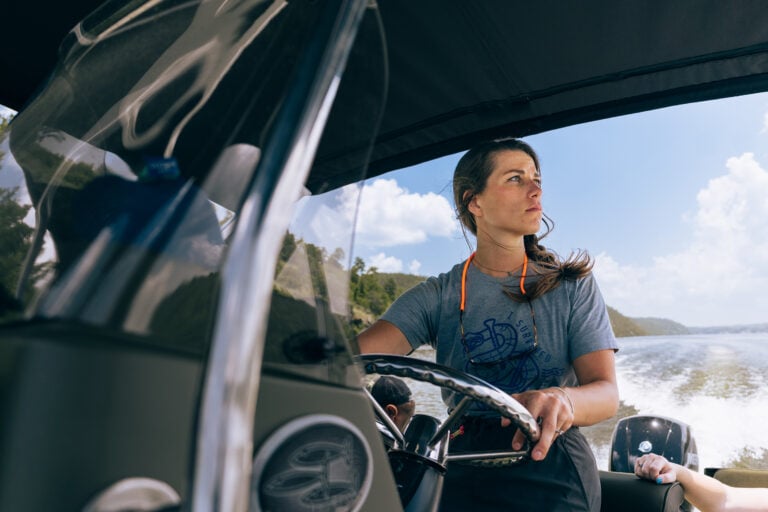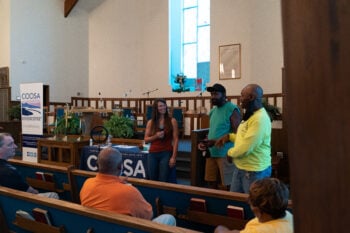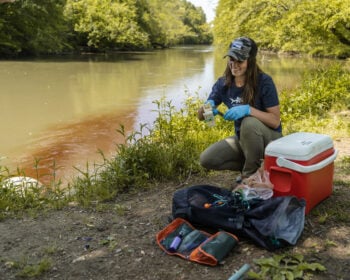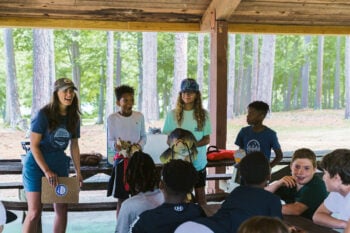Who Is Waterkeeper: Justinn Overton, Coosa Riverkeeper
By: Thomas Hynes

Justinn Overton is the Coosa Riverkeeper in Alabama. The Coosa River is many things to her: an important part of her childhood memories, a driving force behind her work, and an essential source of drinking water for her community. It’s no surprise, then, that she feels a deep connection and a strong passion for protecting it.
As a child, Justinn spent countless hours in the Coosa and any other body of water she could find. But it was during a visit to her grandmother’s house that she first learned how pollution can hide beneath the surface.
“When I was 8 or 9, I wanted to get in this creek near my grandma’s house,” says Justinn. “But my dad wouldn’t let me. I insisted that, yes, I would be getting in that creek, but he told me that I would get sick if I went in it.”
Her father was right to worry. The creek had a high concentration of Polychlorinated biphenyls, which are toxic compounds that were first produced in the U.S., not far from her grandmother’s home in Anniston, Alabama. Not surprisingly, the creek is now an EPA Superfund Alternate site.
This experience deeply affected Justinn, sparking both anger and a sense of injustice. Her first name means “fair,” “righteous,” and “just,” and the idea that polluters could damage something she cherished so deeply felt intolerable to her.
“Being outside was a very safe place for me,” Justinn says. “And I recognize that not everyone gets that experience. The idea that the outdoors—a place I loved so deeply—could be compromised sparked a chain reaction in me. I started recycling programs in high school and at the University of Alabama. I began volunteering for Black Warrior Riverkeeper, and when I discovered there was a Riverkeeper, on a river that I love, I was delighted.”
 Justinn joined Coosa Riverkeeper in 2012 as executive director. In 2020, she became the Coosa Riverkeeper. As she often says, “Rivers have a head and a mouth, but they don’t have a voice.” That’s where Justinn comes in. She certainly has a voice—and a way with words, a unique perspective, and yes, an attitude. But she also has a fantastic sense of humor. Justinn often appears on podcasts, radio programs, and even in church services, using any platform she can find to speak out on behalf of the river.
Justinn joined Coosa Riverkeeper in 2012 as executive director. In 2020, she became the Coosa Riverkeeper. As she often says, “Rivers have a head and a mouth, but they don’t have a voice.” That’s where Justinn comes in. She certainly has a voice—and a way with words, a unique perspective, and yes, an attitude. But she also has a fantastic sense of humor. Justinn often appears on podcasts, radio programs, and even in church services, using any platform she can find to speak out on behalf of the river.
“I’m a southern woman. I was raised to be strong,” says Justinn. “In southern culture, it is often better for a local to advocate for the river. I look to the woods and water for my food too. It’s a privilege to get to protect the Coosa in a way that’s authentic to me and the culture of the Coosa. I come to this space hoping to empower and elevate people, to give them the resources to help themselves and this river.”
Though she is passionately vocal, Justinn also believes in the power of listening. “We could solve a lot of problems that are based on assumptions,” she says. “I think if we learned to listen better, we could have better conversations about the hard stuff.”
The Coosa River runs for about 280 miles. While it originates in Georgia, 90% of the river lies in Alabama. Like many Alabama rivers, the Coosa is rich in biodiversity and natural beauty. It was once home to many steamboats and is even believed to have inspired the fictional cartoon character, Popeye. To that end, Coosa Riverkeeper’s patrol boat is aptly named, The Olive.
The Coosa River is also one of the most developed rivers in Alabama. Dams and impoundments threaten the river’s natural biodiversity. Two leaking coal ash ponds sit dangerously close to drinking water intakes. More than thirty state-issued fish consumption advisories are in place. PFAS contamination and agricultural runoff are ongoing issues. But perhaps most troubling of all is the Alabama Department of Environmental Management, which Justinn believes does little to protect the river or the communities that rely on it.

“The Alabama Department of Environmental Management, or ADEM, is more interested in protecting the permit holders than the river,” says Justinn. “It keeps me up at night. Until we have an agency that is willing to do its job, I have job security. But I really do want to work my way out of this job. I want industry to be held accountable and stop externalizing their cost of doing business to communities along the Coosa River.”
Despite these challenges, the Coosa remains resilient. Justinn points out that, though the river suffered one of the most significant extinctions in North America, it is still one of the most biodiverse rivers in the country. She admires this resilience and, in many ways, tries to emulate it in her own work.
Justinn also recognizes that to care for the river, or anything else, one must first care for themselves. Be it mindfulness, going to therapy, or exercise, it is crucial to her work – and that of all Waterkeepers – to avoid burnout and stay in this fight for the long haul.
Although Justinn is humble and sometimes bristles at praise, she has achieved numerous successes as the voice of the Coosa River. Among other victories, she helped derail an unnecessary and dangerous toll bridge project and stopped an animal rendering plant from being constructed near Neely Henry Lake.
 She has been rightfully recognized for these achievements and her commitment to the health of the river and her community. In early 2024, she was awarded the Floyd L. Donald Community Service Award at the oldest Martin Luther King Jr. Celebration in Gadsden, Alabama. A month later, she received a national River Hero honor.
She has been rightfully recognized for these achievements and her commitment to the health of the river and her community. In early 2024, she was awarded the Floyd L. Donald Community Service Award at the oldest Martin Luther King Jr. Celebration in Gadsden, Alabama. A month later, she received a national River Hero honor.
Despite these well-deserved accolades, Justinn measures her success by the people around her and their relationship to the river. Ultimately, she wants to know that it’s safe for people to swim, fish, and drink the river’s water—something that would benefit both the people in her community and the river itself.
“I want people to respect and love this river for what it is,” Justinn says. “The more people who get outside and become curious about the river, the more people will protect it.”
All photos provided by Justinn Overton.